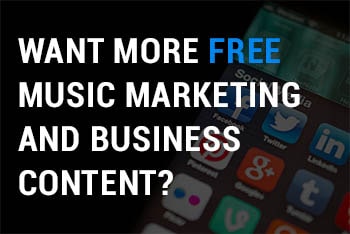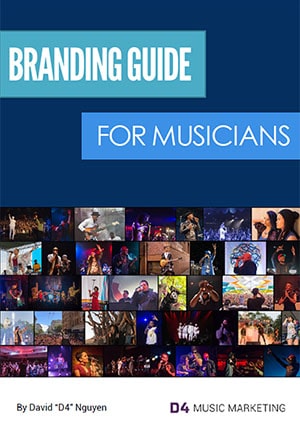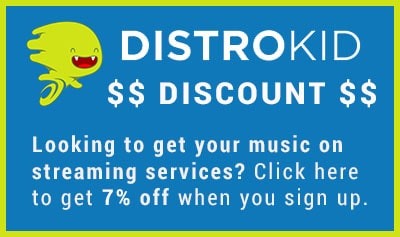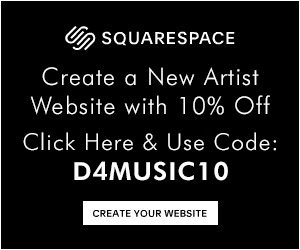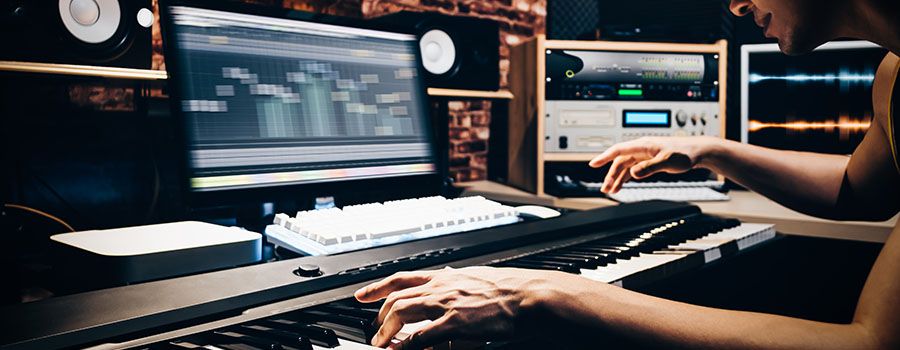
Many musicians want to make music a full-time gig, but many of them aren’t taking music seriously enough. More specifically, they’re not willing to invest their money back into their business to grow their music career properly. With so much market saturation in music, only focusing on free promotion tactics and looking for shortcuts or hacks is not enough to turn a hobby into a career for most artists.
To be fair, it’s not easy. It can even be overwhelming at times. The decline in record sales and the rise in streaming has made it more difficult for emerging musicians to earn a stable income off physical music. This is why it’s important for all musicians to know the various income sources that are available to you.
Even with consistent income, it takes smart investments in yourself to increase your chances of making it in this industry. In general, there are two things you can use to invest – time and money. Time will always be your most valuable asset, and what you have the most control over, so use it wisely.
Check out this blog for some time saving tips for musicians.
Unless you take your business seriously, you can’t expect others to take you seriously. You have to strategically invest in yourself first before you can expect others to invest in your music and your brand.
Here’s a general overview of what I feel are the smartest ways you can invest your time and money towards a full-time music career. It’s in no particular order, so how you decide to balance it is on you.
Time
1. Creating Music / Content
As a performing artist, producer or songwriter, your biggest priority is to be the creative that you are and make music. It should be very obvious, but your focus should be around how to maximize your creative output as your business depends on it. This is one of the top things you need to free up to invest more time into creating down the line. This includes various video content as well that is related to your music or brand.
The goal isn’t just to create music, but also to release it in a timely manner at a rate that you are comfortable with. Create a plan where you’re releasing singles on a regular basis to help create momentum for you.
For more on releasing singles, I wrote a step-by-step guide with free downloadable checklists you should check out.
2. Practicing Musical Skills
No matter how talented you are, you should still keep practicing and refining your skills. All the artists I work with constantly dedicate time to practice. It could be to work on vocals, your ability to improvise musically or even playing songs you already know.
Music is such a competitive, saturated industry that you need every edge you can get. The more polished you are with your abilities and performances, the more professional you look and more likely to impress.
3. Rehearsing / Improving Live Performance
If you want to be a live performer, you’ll definitely want to invest time in this area. Just because you can sing, rap or play an instrument well on record, doesn’t mean it’ll translate into performing live in front of a crowd. You need stage presence.
It’s a whole different skill set that you’ll want to perfect over time because live performance helps to serve three important areas in your career:
- Win over new fans who may have not heard of you
- Strengthen the relationship with your current fans
- Provides one a major income source for musicians that can’t be replaced
For more on live performances, here are the things you want to avoid doing.
4. Branding
Developing your brand is something I really emphasize as key in today’s music industry. Investing time in this area is about how to be more intentional with who you are as a brand because you are a brand whether you acknowledge it or not. When you can effectively communicate who you are and what you stand for through your brand, it makes it easier to attract your ideal fans.
While many focus a lot on width or the promotional side (like gaining more exposure), you also need to consider the depth of your fan relationships through branding for the long term success of your career.
For more on branding, I put together a free eBook I recommend you check out.
5. Artist Development / Education
I’m a big believer that learning new things and developing your skills is something that should never stop. As independent artists, it’s much more crucial because you are solely responsible for your own artist development. You are in charge of making sure you have the knowledge, skills, experience and branding to be a musician on a professional level.
There’s a vast amount of free information and education online so there’s really no excuse. You can learn so much from blogs and YouTube for free. In some cases, it may be harder to learn that way so it helps to pay for classes or online courses.
Ideally, a lot of the things you want to focus on learning are related to the music business and marketing, so you can eventually outsource those certain areas. You want to learn it well enough so you can build a team to handle it for you. This also applies to learning new creative-related topics related to music production, songwriting or playing a new instrument. The more complete of a package you are, the better chance you’ll make it as an independent artist.
For musicians on a budget, a site I recommend to check out that offers a lot of different courses that can help you develop as an artist is SkillShare. (Affiliate Link Disclosure)
I like SkillShare because it’s affordable and subscription-based where you take as many courses as you want for as low as $8 a month. I’m actually planning on creating courses on this platform myself. They are offering a free 14 day trial to take as many premium courses as you want within that period If you cancel before that, you don’t pay anything. If you’re interested, sign up now to start your free trial at SkillShare. (I get a small commission for signups at no extra cost to you. Read my full disclosure to learn more.)
6. Networking / Growing Professional Relationships
Depending on what your goals are as a musician, one of your biggest time investments could be to find your tribe or community that you can network and build with. This could be locally, or even online.
Although it’s entirely possible (but not very likely) to be successful by yourself, you’ll have a better chance when you build with other like-minded people related to your niche. To make this work, you’ll need to adopt a community mindset.
I talk about this in depth in my blog about identifying your niche.
7. Self-Care
This is an area that has become a bigger topic over the years. Your physical and mental health should always be a priority, so it’s important to know when to take time off and focus on your well-being. Being a full-time musician can be very taxing on the body and mind, especially if you become a touring musician. You can’t sustain a career in music if you can’t sustain your health, so invest in self-care. Incorporate it into your routines.
Health is an area I’m passionate about, and I’m in the process of building a new project dedicated to musician health in the near future.
Money
8. Recording Equipment
I can’t comment too much on this because I’m not a musician myself, nor do I have any interest in being an expert in music production, but most of the artists I work with have their own personal recording space.
Investing in all the recording and soundproofing equipment for a home studio can be pricey, but the ability to record music at home could pay off in the long term. Studio time costs can add up. Not to mention, it saves time having to travel back and forth to the studio.
Here’s a video where Russ talks about the importance of building a home studio:
In today’s climate where it’s so important to put music out consistently, it makes sense that one of the best investments you can make for your business is the ability to record at home. This is something you can easily research and be able to find affordable options.
9. Mixing and Mastering
Before distributing your songs for public consumption, you’ll want to mix and master them to make sure they sound the best in any playback system. This may not apply for every musician as some genres and musical styles may deliberately prefer a more raw or imperfect sound.
For those who may be new music recording and production:
“Audio mixing is the process of taking recorded tracks and blending them together. Tracks are blended using various processes such as EQ, Compression and Reverb.”
“Mastering is the final step of audio post-production. The purpose of mastering is to balance sonic elements of a stereo mix and optimize playback across all systems and media formats.”
From Landr’s What is Mastering
You can invest time in learning how to do it yourself, or you can pay someone to do it for you. Ideally, you want to pay up for an experienced mixing and mastering engineer to handle it, but it may not always be feasible. The cost can range from a couple hundred per song to over a thousand for the top-level engineers.
However, at least for mastering, there are affordable online services that you can pay for to master your songs in a few minutes like Landr. I have a client that uses them for singles we’ve released as well as songs used in video content for social media. For example, we used Landr for What a Wonderful World.
It is free to sign up and try out Landr. You get 2 free 192 kbps Lo-MP3 downloads per month to test out. If you want a higher quality WAV file to release to platforms like Spotify and Apple Music, it costs only $9.99 to download their mastered track. This would be a cheaper option, but paying professionals to do it is ultimately the way to go, especially for bigger projects.
10. Photography / Videography
Content is king. It’s not enough to just have good music anymore. You’ll need high-quality photos and videos to engage your audience as well. You can get by with a smartphone for certain things, but you’ll definitely want to build connections with good photographers and videographers so you can hire them when needed.
For example, you need to have professional-looking, high-resolution photos for your website, your bio, press releases and social media posts.
For certain video projects, you’ll need to have something with higher production value, like a music video.
If money is tight in the beginning, you might be able to find photographers and videographers in your area who are willing to do things for free, or really cheap to get some experience. Eventually, you definitely want to invest in the best you can afford.
After all, the quality of your output is a reflection of you as a brand. If you put out amateur quality photos and videos, you will give people the impression that you shouldn’t be taken seriously. (Unless it is done intentionally as part of your branding strategy.)
11. Promotion and Marketing Budget (Social Media Ads)
One of the biggest questions and complaints I tend to get revolves around music promotion. The common questions are always about “how to promote my music” and “why is no one listening to my songs when I post them on social media.” For as much as you spend on creating content, you need to spend at least the same amount to promote and market it.
In my opinion, the most effective way to promote your music is to pay up (or invest) into social media ads like Facebook or Instagram. If you believe in what you do, you should have no problem in investing money into your business and paying for hyper-targeted promotion.
I know it can be intimidating because there’s learning and experimentation involved. Not to mention, you can easily blow your money if you don’t know what you’re doing. But, if you don’t know how to do it, you can pay an online marketer like me to handle it.
How much do you need a budget? When starting off, you’ll definitely want to start small, like $20 to $40 in your first campaign. Once you know how things work and have a strategy in mind, I find that spending a few hundred dollars each campaign to promote a single could yield great results. That is, assuming you have good video content or visual to use as the ad itself.
In the near future, I plan to do a complete guide on Facebook and Instagram ads for musicians. Here’s one blog you can start off with.
12. Graphics / Website
When you want to be taken seriously as a professional, visual presentation is important. You’ll want to find a freelancer you can reach out to for all your graphic needs. This includes things like a logo, album art, show flyers, website graphics and social media covers.
For those on a budget, I recommend using a free graphic design app like Canva. (This is an affiliate link for a service I personally use and recommend. Read my full disclosure here.)
They have a bunch of free templates for all types of designs like t-shirts, social media covers, flyers and even album covers. The best part is their free plan has basically everything you would need and it’s easy to use. If you want more design options, templates and features, you can subscribe to their Canva Pro plan. Otherwise, sign up for a free account. (Affiliate Link)
Having a website is also something I recommend all musicians invest in, to help you come off more professionally. You can check out this blog on everything you would need on your website.
Conclusion
Whether it’s time or money, you need to constantly invest in yourself if you want to make a living off music full-time. During that journey, you’ll meet people, allowing you to build a network of skilled and talented individuals, whom you can depend on, and possibly become a part of your team. The goal is to build your career to the point where you can start paying others (buying other people’s time) to handle specific tasks, to allow more time to focus on areas you can’t outsource.
You have to be willing to put up the capital and bet on yourself. If you can’t invest in yourself as a professional or ensure your music is high quality, how do you expect fans or anyone else to invest in you?



